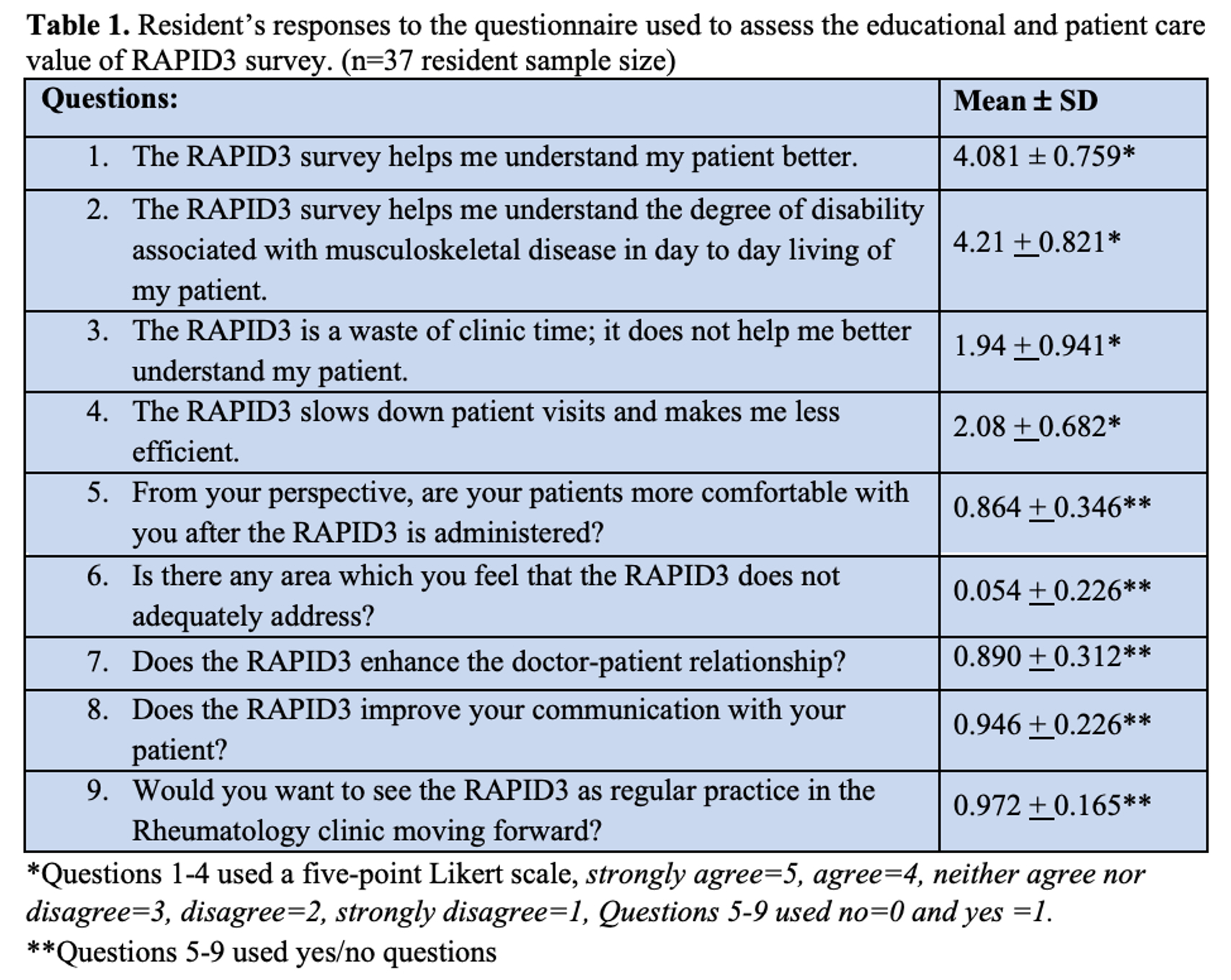Session Information
Date: Monday, October 27, 2025
Title: (1248–1271) Patient Outcomes, Preferences, & Attitudes Poster II
Session Type: Poster Session B
Session Time: 10:30AM-12:30PM
Background/Purpose: When treating patients with rheumatological conditions, building a strong physician-patient relationship plays an important role in determining disease outcomes. The Routine Assessment of Patient Index Data 3 (RAPID3) is a patient reported outcome measure which is administered to patients in rheumatology clinics. We initiated use of the RAPID3 assessment in our clinic with the hypothesis that in addition to assessing patient reported outcomes, this tool would help residents better understand the disabling effects of rheumatological diseases and that it would also enhance physician-patient relationships by giving the patient a voice to express themselves and explain the impact of their diseases on their daily lives. This study analyzes the impact of RAPID3 on resident education, doctor-patient relationships, and patient care using a 360-degree assessment of both the resident physician and patient perspectives.
Methods: RAPID3 surveys were administered to all patients (regardless of diagnosis) during their clinic visit, with assistance as needed by the resident physician, and responses were discussed with the patient during the clinic visit, in two resident-staffed outpatient Rheumatology teaching clinics at our institution over a 6-month period. After the clinic visit, patient surveys were administered to patients by research volunteers (CB, HL) who were not part of the medical team. Anonymous surveys were also sent to all resident physicians after each clinic session. The surveys included both yes/no questions as well as 5-point Likert scale questions. The mean plus standard deviation was then calculated for each answer.
Results: Resident Belief of Impact of RAPID3 on physician-patient relationships: 89.2% residents agreed/strongly agreed that RAPID3 helped them understand their patient better. 89.2% agreed that RAPID3 helped them get a deeper understanding of the degree of disability patients experience. 86.5% of residents felt that patients were more comfortable with them after completing the survey (Table1).Resident Acceptance of RAPID3: 91.9% disagreed/strongly disagreed that RAPID3 is a waste of clinic time. 97.3% agreed that the RAPID3 should be a regular part of all future clinics (Table 1).Patient Acceptance of RAPID3: 86.5% of patients agreed/strongly agreed that the RAPID3 should be used at every visit (Table 2).Patient Belief of Impact of RAPID3 on physician-patient relationships: 89.9% of patients felt more comfortable with their physician after the survey. 93.3% of patients felt the survey helped the physician better understand the daily impact of disease (Table 2).
Conclusion: RAPID3 was well accepted among patients and residents. It serves as a helpful tool for residents (normally young and healthy) to realize the barriers that patients with rheumatologic and musculoskeletal diseases face. It helped improve patient-physician communication and helped patients feel more comfortable with their physician. Future research may include how to shorten the RAPID3 (i.e., which questions are superfluous) and try to administer RAPID3 regularly prior to visits to always prioritize patient reported outcomes.
To cite this abstract in AMA style:
Sapkota N, Birnbaum C, Levitansky H, Andriushchenko Y, Malik S, Andrade M, Choi S, Terebelo S. Patient Reported Outcome Measures: Assessing Resident Physician Acceptance of the Routine Assessment of Patient Index Data 3 Survey and its Impact on Physician-Patient Relationship [abstract]. Arthritis Rheumatol. 2025; 77 (suppl 9). https://acrabstracts.org/abstract/patient-reported-outcome-measures-assessing-resident-physician-acceptance-of-the-routine-assessment-of-patient-index-data-3-survey-and-its-impact-on-physician-patient-relationship/. Accessed .« Back to ACR Convergence 2025
ACR Meeting Abstracts - https://acrabstracts.org/abstract/patient-reported-outcome-measures-assessing-resident-physician-acceptance-of-the-routine-assessment-of-patient-index-data-3-survey-and-its-impact-on-physician-patient-relationship/


.jpg)